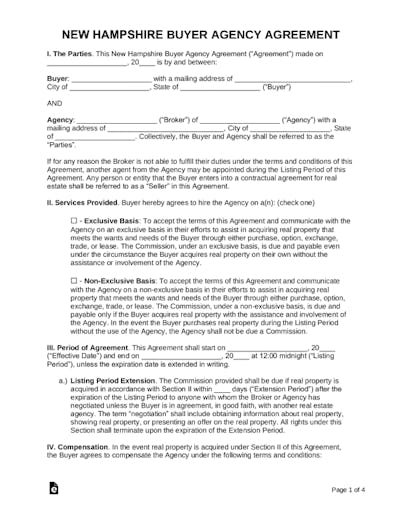The journey of buying a home is a very exciting, yet sometimes difficult, process. Learning the lingo that people in real estate use beforehand better prepares you to get your foot in the door (both literally and figuratively). It will help speed up the process so you can get to seeing listings with your agent faster.
What is a buyer’s agent and a buyer agency agreement? A buyer’s agent is a real estate professional who helps and guides a buyer through the process of buying a home. So, if you are looking to buy a new home, you should research local New Hampshire real estate agents and identify one that will help satisfy your needs. You may need to meet with a few different agents to get to know them and decide who would be the best fit for you. Once you choose a real estate professional (i.e. your buyer’s agent), you will then fill out and sign a buyer agency agreement, which is a written contract between you, the buyer, and your buyer’s agent, a real estate professional, outlining the terms of the services that will be provided.
Now, do not let the word “contract” scare you. This written agreement, or contract, provides clarity between you and your buyer’s agent. When writing out the buyer agency agreement, you and your buyer’s agent are creating an “agency relationship”. This means that the agent (also known as a REALTOR® or broker) is agreeing to solely represent you and your interests, without regard to their own financial interests. They are agreeing to represent you and act on your behalf throughout the purchase of your home, and provide you with things like confidentiality and disclosure.
To recap, a buyer’s agent is your chosen real estate professional and the buyer agency agreement is the contract between you and your chosen real estate professional.
Well what does the buyers agency agreement actually agree on?
Terms
The terms of a contract are the most important. A buyer agency agreement is generally a preprinted form with some blank spaces to be filled in based on what you and the buyer’s agent agree upon. The blank spaces are typically the type of exclusivity, the type of property you are looking for, and the geographical area you want the home to be in.
Exclusivity
This means when you sign the buyer agency agreement, you are agreeing to solely work with one agent. Unless you sign a nonexclusive contract, you will only work with the one buyer’s agent. By doing this, it allows the real estate professional to understand how serious you are about your relationship with them so in turn they can give you premier service. If you are exclusive to your buyer’s agent, they will happily put in more time to find you the right listing because in the end you buying a home is what's responsible for them getting paid. Because real estate agents earn income based off of commission, they want you to find the right fit. If you exclusively commit to them, the agent has assurance that if you buy a home they will be compensated..
Agents vs Brokers
Although these terms come from the same idea, their meaning and education levels are different. An agent brings you to various homes and scours the map for listings. An agent is hired by the broker, who has met advanced education and licensing requirements allowing them to hire and manage agents. Over time in real estate, an agent will oftentimes become a broker, yet still continue working with buyers.
Duration
When creating your buyer agency you and the buyer’s agent will state how long an exclusive term will exist. It could either be shorter or longer depending on your needs. If you are nervous the agent will not help fulfill your needs, you could agree on a shorter term of exclusivity so it can act like a trial. Sometimes finding a home you love can be a long process, especially in a seller’s market, so if you’re confident with your choice of a buyer’s agent you may consider a longer term for your agreement.
Commission
The average commission paid to real estate agents is 5% - 6%. This is paid by the seller at the time of closing, and the commission is split between the buyer’s and seller’s brokerage, who then pays its agents based on their agreed upon terms. However, you will likely agree to a specific amount of compensation in your buyer’s agency agreement, which means you may be required to pay part of your buyer agent’s commission at the closing if the seller does not contribute enough to cover the amount you agreed to.
Now that you understand what a buyer’s agent and a buyer agency agreement is, as well as some other terms that come along with it, you can be much more confident and excited to look for a new home. Visit our agents page and use the filter options to find a Gove Group agent who will be a good fit for you!
Source: quickenloans.com






I love reading your article. Thank you for sharing. Keep on posting.